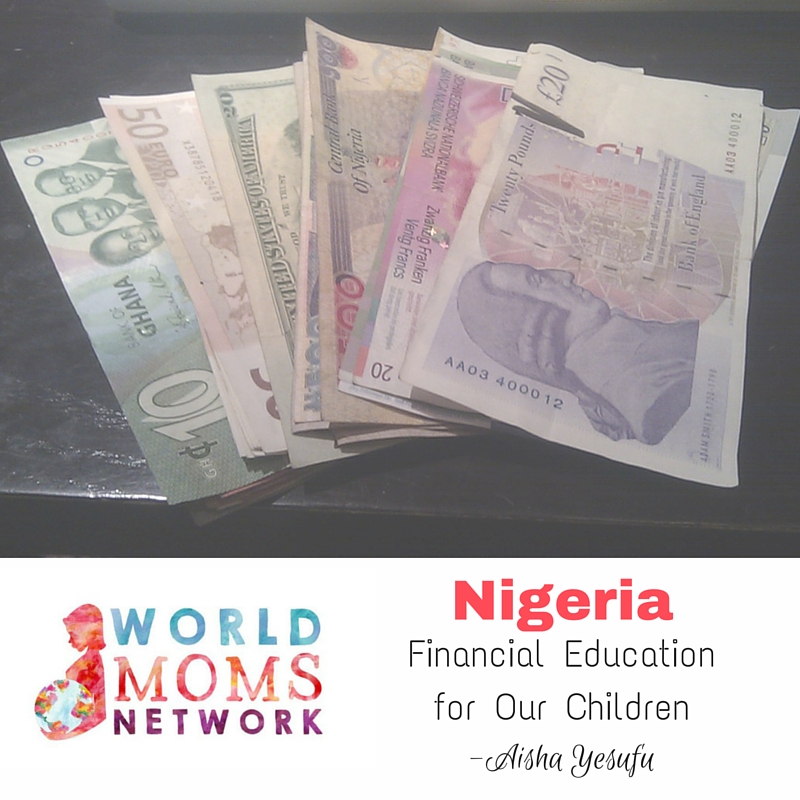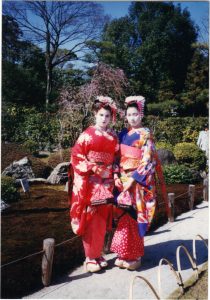by Aisha Yesufu | Jul 7, 2016 | 2016, Africa, Africa and Middle East, Communication, Education, Family, Motherhood, Nigeria, Priorities, School, Study Abroad, Travel, World Motherhood

“Mummy, is it Buhari’s fault that the economy is bad?” My daughter asked me this when she returned from school one day. She’s referring to Muhammadu Buhari, the president of Nigeria. “You must always call him President Buhari,” I corrected my daughter. Then I realised this was another opportunity to educate my daughter about economy and finances.
I told her it’s not President Buhari’s fault that the economy is bad, rather it is the choices we made as a country. I told her Nigeria is like a big family. Imagine that the father had a big job and they paid him a very good salary. In this family, perhaps the mother chose not to work because the father’s salary was so good. The family lived well, and often traveled abroad for holidays, wearing designer clothes. Everything they did was expensive. They had huge parties all the time. Their children went to expensive schools and they go abroad for treatment even for a simple headache.
The father earned well, but did not save anything and sometimes borrowed even more money to maintain their extravagant lifestyle. At one time some family members started stealing the money for their own personal enjoyment. They stole this money right out of the family account.
One day the company the father worked for was no longer able pay the father his big salary, so they gave him a pay cut. Remember, the father did not save when he was earning a high income. Remember, the family led a very expensive lifestyle. Remember, the mother had no job, so she couldn’t support the family. So, there was problem.
Eventually, a new father was brought in and the salary was reduced further and further. The family still had no savings and money was still being stolen from the family account. The new father found it difficult to support that expensive lifestyle the family was accustomed to. In this case, there would be economic problems and it wouldn’t necessarily be the father’s fault. In the meantime, the father must still deal with the people who stole from the family account, and try to recover the money.
“Do you understand now?” I asked. “Yes, I do,” said my daughter, and she went away, satisfied.
Our children know something is wrong and we need to explain to them what is going on. At a school meeting recently, I overheard a parent wondering how can she tell her child they can’t afford to pay school fees? I told them as parents you need to financially educate your children. This is not done in school, so it’s the parent’s duty to ensure that children are aware of economy and finances.
My children are part of our family’s economic life. They know what’s going on in our businesses and their father’s job. They know when things are good that we are investing, and they know why we invest. They know where the money for their school fees is coming from and what sacrifices were made to make ends meet. When business is bad, they know. At one time I thought we couldn’t pay my daughter’s school fees and I told her she had to delay a week or more before starting school (we always pay school fees before resumption date. It’s my personal stand). Luckily we managed to pay on time, but she learned that it’s a possibility and understands life sometimes throws a spanner into the works.
When we joined my husband in Abuja in 2011, my children’s school fees were fifty times higher than what we were used to paying. I had to sit my children down to explain that we needed to make sacrifices for their education. One of the decisions we made as a family was to reduce travelling abroad for holidays. So we did, and my children understood why.
In December, my daughter went to Europe for her school’s annual ski trip. She noted that there were a lot fewer students on the trip than previous years. My daughter also went to Wales this month for the Duke of Edinburgh expedition. Similarly, not all the students participating in the Duke of Edinburgh programme went for the expedition. I had to explain to her there was economic downturn and it was not easy for all families to afford such trips. At the moment, we are seriously worried about paying for education because our currency was losing value. She gave me a worried look and said, “God willing, everything will be okay.” “Amen,” I replied.
My daughter left the house a better-informed child. I hope that when she becomes an adult, she will be better prepared for economic and financial challenges because she learned about it as a child. As parents, we cannot shield our children from the reality of life. Let them learn from us and be more financially savvy.
How do you ensure that your children get a good understanding of your family finances?
This is an original post written for World Moms Blog by Aisha Yesufu in Nigeria.
Photo credit: Bob Ryskamp / Flickr

by Kyla P'an (Portugal) | Dec 11, 2014 | 2014, Adolescence, Awareness, Being Thankful, Bilingual, Cultural Differences, Culture, Education, Eye on Culture, Friendship, Inspirational, International, Japan, Language, Life, Life Lesson, Living Abroad, Multicultural, Parenting, Relationships, Responsibility, Study Abroad, Traditions, Travel, USA, World Motherhood

The author with her Japanese host family,
Oshogatsu (New Year’s Day), 1994
When I was eight years old, my mom moved from our home, outside of Philadelphia, Pennsylvania, to start a new life for herself in Los Angeles, California.
Growing up on the East Coast of the US, in the 1970’s, I had been exposed to only small pockets of Asian, immigrant populations; I knew nothing of the large, well-established Asian populations out on the West Coast.
On one of my first trips out to visit, my mom took me to an area of Los Angeles called Little Tokyo. As its name infers, it was a predominantly Japanese neighborhood and wandering around its streets made me feel like I had been transported to a different land.
I can’t remember if I had ever had sushi before my visit but certainly I had never experienced sushi in as authentic a setting as the restaurant she took me to that day.
The entrance involved crossing a wooden bridge over a small koi pond. There were stone lanterns and bonsai trees. the waitresses were all clad in kimono and the sushi arrived at our table on small wooden planks. I was mesmerized. For me, it was love at first…bite.
This experience had such an impact on me that, from that day on, I was enthralled by anything Japanese. I wanted to know everything I could about the country, culture and its people.
The Japanese were the great inventors of all things prominent in my childish memory: Iron Man, Godzilla, Kero-Kero Keroppi, Hello Kitty, my first Walkman. What a genius tribe they must be!
The rise of my curiosity coincided perfectly with the rise of the Japanese economy. Access to their food, products and even language grew increasingly accessible.
When I was in high school, a small group of students expressed their desire to study Japanese, a language option not yet offered at my school. Fortunately for us, since our school was less than an hour from Yale University—one of the US’s leading colleges—we petitioned for and received permission to get transportation to Yale one evening a week, so we could take an introductory-level Japanese language class there.
When I began researching colleges the following year, I selected only those with an established Japanese language program and study abroad opportunities.
I ended up at a small, liberal arts college in Tennessee with a strong International Studies department. I enrolled in every Japanese class they offered. In my sophomore year, I applied for and was accepted into my school’s Japanese exchange program with our sister university in Osaka, Japan.
At the end of my sophomore year, when all students had to declare their majors, I–along with one other student–petitioned for and was granted permission to develop the school’s first degree track in Japanese Studies. It seemed an auspicious plan, considering the Japanese purchase of the iconic, US landmark, Rockefeller Center, earlier that same year.
I spent my entire junior year of college abroad, studying at a Japanese university, living with two separate Japanese families and absorbing as much of the country and culture as possible for a college-aged kid.
I turned 21 there, a major American coming-of-age. I participated on Japanese sports teams, took painting and pottery classes, studied the culture through the fascinating lens of manga (Japanese comics), dated only Japanese men and immersed myself in the pursuit of understanding all things Japanese.

The author and her host sister dressed in kimono
My study abroad experience had an unbelievable impact on my life. It launched my passion and insatiable hunger for travel and Asia, beyond Japan.
I gained greater independence, broadened my global perspectives, forged life-long friendships, developed cultural empathy and experienced life as a minority; a gaijin (outsider) in a homogeneous land.
I consider my study abroad experience the foundation of the life I built upon it. I know that many of us here at World Moms Blog also have had experiences living and studying abroad; it is one of the many ties that bind us. We are global citizens striving to raise our own children in an increasingly globalized world.
But, as you will learn later today from World Moms Blog Founder, Jennifer Burden, here in the US, accessibility to and enthusiasm for studying abroad are not as prevalent as many of us may think.
So what’s it like in your country? Are study abroad programs prolific on your college campuses? Did you benefit from studying abroad? Tell us about what the experience means to you.
And stay tuned later today for Jen’s post on Studying Abroad and how the White House is playing a part…
This is an original post to World Moms Blog from our managing editor and mother of two rising, global citizens, Kyla P’an.
The pictures used in this post are credited to the author.
Kyla was born in suburban Philadelphia but spent most of her time growing up in New England. She took her first big, solo-trip at age 14, when she traveled to visit a friend on a small Greek island. Since then, travels have included: three months on the European rails, three years studying and working in Japan, and nine months taking the slow route back from Japan to the US when she was done. In addition to her work as Managing Editor of World Moms Network, Kyla is a freelance writer, copy editor, recovering triathlete and occasional blogger. Until recently, she and her husband resided outside of Boston, Massachusetts, where they were raising two spunky kids, two frisky cats, a snail, a fish and a snake. They now live outside of Lisbon, Portugal with two spunky teens and three frisky cats. You can read more about Kyla’s outlook on the world and parenting on her personal blogs, Growing Muses And Muses Where We Go
More Posts - Website
Follow Me:










